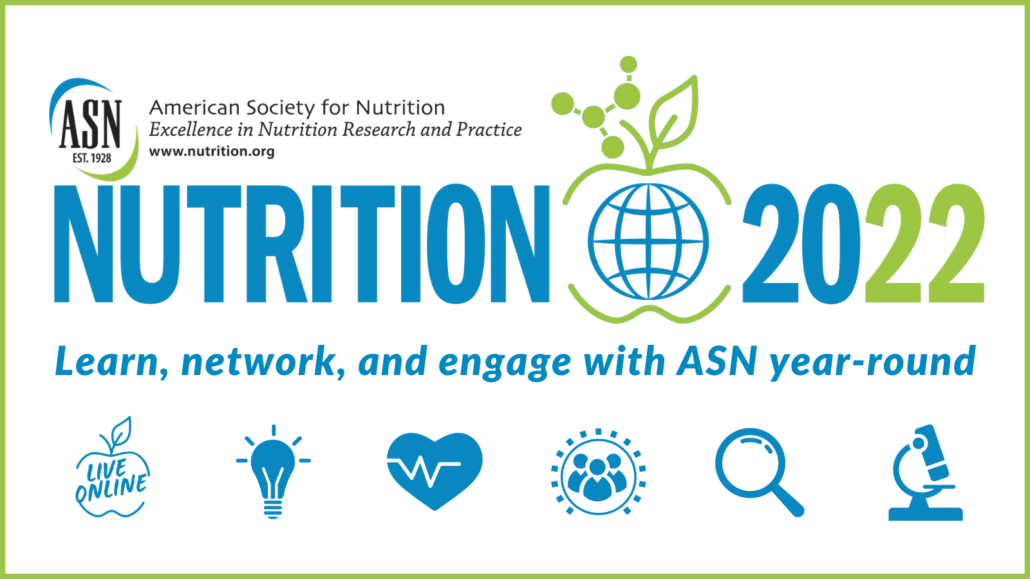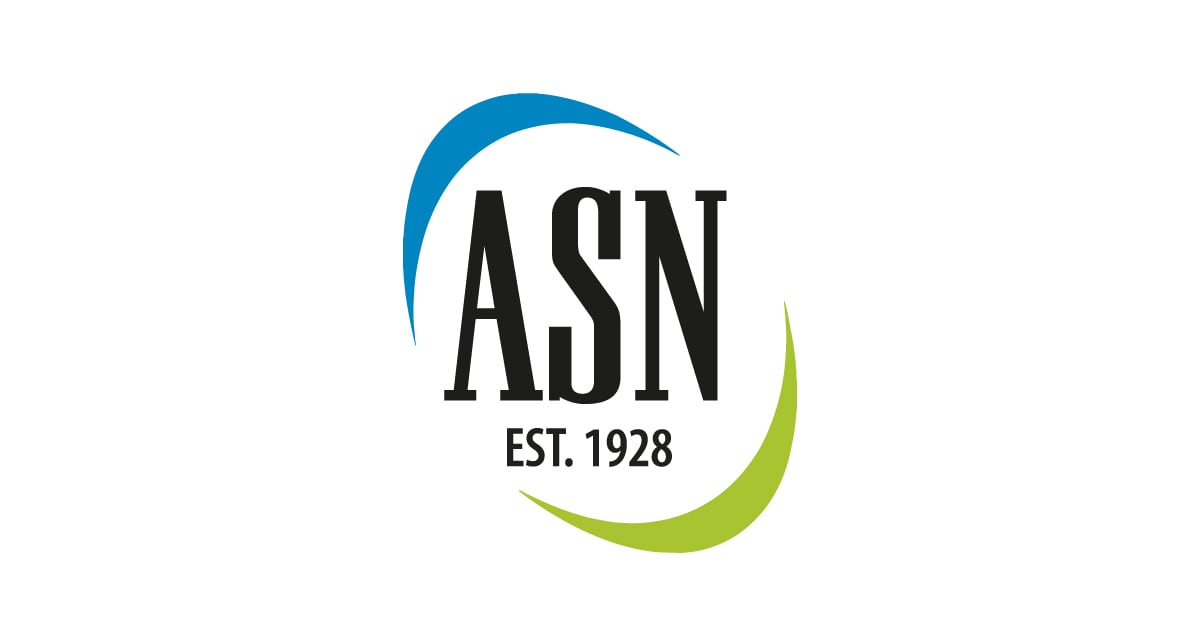A monthly newsletter bringing you the latest from ASN Publications
July Editor’s Choice
The Journal of Nutrition
Volume 152, Issue 7, July 2022
- Estimating Childhood Stunting and Overweight Trends in the European Region from Sparse Longitudinal Data. Chitra M Saraswati, Elaine Borghi, João J R da Silva Breda, Monica C Flores-Urrutia, Julianne Williams, Chika Hayashi, Edward A Frongillo, Alexander C McLain. J Nutr 2022; 152:1773–1782.Editorial: Advancing Nutritional Epidemiology by Linking Datasets and Addressing Data Quality. Amelia B Finaret. J Nutr 2022; 152:1595–1596.
- Sex Differences Across the Life Course: A Focus On Unique Nutritional and Health Considerations among Women . Regan L Bailey, Tieraona Low Dog, Abbie E Smith-Ryan, Sai Krupa Das, Fiona C Baker, Zeynep Madak-Erdogan, Billy R Hammond, Howard D Sesso, Alex Eapen, Susan H Mitmesser, Andrea Wong, Haiuyen Nguyen. J Nutr 2022, 152:1597–1610.
- Biomarker-Calibrated Red and Combined Red and Processed Meat Intakes with Chronic Disease Risk in a Cohort of Postmenopausal Women. Cheng Zheng, Mary Pettinger, G A Nagana Gowda, Johanna W Lampe, Daniel Raftery, Lesley F Tinker, Ying Huang, Sandi L Navarro, Diane M O’Brien, Linda Snetselaar, Simin Liu, Robert B Wallace, Marian L Neuhouser, Ross L Prentice. J Nutr 2022; 152:1711–1720.
The American Journal of Clinical Nutrition
Volume 116, Issue 1, July 2022
- Birth length is the strongest predictor of linear growth status and stunting in the first 2 years of life after a preconception maternal nutrition intervention: the children of the Women First trial. Nancy F Krebs, K Michael Hambidge, Jamie L Westcott, Am J Clin Nutr 2022;116:89-96.Editorial: Starting life right: birth length matters. Parul Christian. Am J Clin Nut 2022; 116, Issue 1, July 2022, Pages 1–2.
- Abnormal urinary loss of vitamin C in diabetes: prevalence and clinical characteristics of a vitamin C renal leak. Ifechukwude Ebenuwa, Pierre-Christian Violet, Sebastian Padayatty, Yaohui Wang, Yu Wang, Henry Sun, Preston Adhikari, Sheila Smith, Hongbin Tu, Mahtab Niyyati, Kenneth Wilkins, Mark Levine. Am J Clin Nut 2022; 116:274–284.Editorial: Is “renal leak” of vitamin C an issue for people with diabetes? Anitra C Carr, Helen Lunt. Am J Clin Nutr 2022; 116:3–4.
- Vitamin B-12 malabsorption and renal function are critical considerations in studies of folate and vitamin B-12 interactions in cognitive performance: NHANES 2011–2014. Marsha E Samson, Lorraine F Yeung, Charles E Rose, Yan Ping Qi, Christopher A Taylor, Krista S Crider. Am J Clin Nut 2022; 116:74–85.Editorial: Muddy water: Additional observational data cannot aid in determining whether there is a physiological interaction between low vitamin B12 and high folate in cognitive health. Regan L Bailey, Patrick J Stover. Am J Clin Nut 2022; 116:5–6.
- Dose-dependent effect of carbohydrate restriction for type 2 diabetes management: a systematic review and dose-response meta-analysis of randomized controlled trials. Ahmad Jayedi, Sheida Zeraattalab-Motlagh, Bahareh Jabbarzadeh, et al. Am J Clin Nutr 2022;116:40-56.Editorial: How strong is the evidence base for carbohydrate restriction in the management of type 2 diabetes? Gary Frost. Am J Clin Nut 2022; 116:7–8.
Advances in Nutrition
Volume 13, Issue 3, May 2022
- “Carnosine has the potential to improve healthy and diseased myocardial function,” according to Physiological Roles of Carnosine in Myocardial Function and Health. The authors, however, point to “a significant gap in our understanding and application of carnosine within the cardiovascular system,” calling for human studies to “evaluate the effectiveness of carnosine on myocardial function in clinical populations with an associated cardiovascular disease risk co-morbidity before conducting interventions in higher-risk individuals.”
- Current Insights in Nutrition Assessment and Intervention for Malnutrition or Muscle Loss in People with Lung Cancer: A Narrative Review explores malnutrition and muscle loss among people with lung cancer as well as nutritional interventions to treat these conditions. The authors found that “individualized dietary counselling, increasing protein intake and supplementation with omega-3 fatty acids appear to be beneficial for some, albeit varying, patient outcomes.” In particular, “multimodal interventions, generally including a nutrition and exercise component, show promising results.”
Current Developments in Nutrition
Volume 6,Issue 7, July 2022
- Inflammatory bowel disease is an idiopathic inflammatory disease. The pathogenesis of this disease and its therapeutic targets remain elusive. Studies exploring the role of human gut microbiota in health and disease, however, do suggest that the pathogenesis of inflammatory bowel disease may be highly associated with imbalances of the gut microbiota or alterations of epithelial barrier function in the gastrointestinal tract. In response, Diet-Induced Host-Microbe Interactions: Personalized Diet Strategies for Improving Inflammatory Bowel Disease reviewed the association of inflammatory bowel disease with diet-induced changes in the gut microbiota, including how diets can modulate host gut microbes and immune systems. According to the authors, “diet is an environmental factor that affects microbial composition and function, intestinal epithelial barrier, and immune cells.” The authors do, however, note that additional confounding factors make it challenging to achieve consistent results in the management of inflammatory bowel disease. Pointing to promising new studies, the authors believe that “the development of computational science, along with the accumulation of multi-omics data regarding the regulation of individual genomes, transcriptomes, and gut metagenomes by dietary interventions, could lead to a successful personalized approach for an inflammatory bowel disease intervention diet.”
Reader Specials
2021 Journal Impact Factors Released!

2021 Impact Factors and Scopus ranking of journals have been released and remain strong for ASN’s journals. The high citation rates to ASN’s 4 journals are evidence of our Editors’ commitment to rigor, reproducibility and efforts to increase trust in nutrition science. The ASN journal portfolio is recognized worldwide for its outstanding leadership and exceptional content, and many individuals – from authors to reviewers to editorial board members – contribute to our continued success.
ASN Journal Impact Factors
The Journal of Nutrition: 4.687
The American Journal of Clinical Nutrition: 8.472
Advances in Nutrition: 11.567
Although Current Developments in Nutrition has not yet received its first Impact Factor, it has received a 2021 CiteScore of 4.2 from Scopus. CiteScore measures the average citation received per document published in the journal.
A limited collection of the excellent work published by ASN can found in the Highly Cited Collection.

Food Environment Policy Impact: Evaluation and Findings from the International Food Policy Study

A range of policies are being implemented globally to support healthy food choices at a population level. The International Food Policy Study (IFPS) consists of repeated cross-sectional surveys conducted in 5 high- and upper-middle-income countries. The IFPS project has the potential to address important gaps in national monitoring surveys for dietary patterns, and to evaluate the impacts of novel food policies implemented in any of the 5 countries over the study period.
In June, The Journal of Nutrition published a journal supplement from the IFPS project. Articles address impacts of COVID-19 on diet-related behaviors, nutrition labels, food and beverage marketing, the intersection of racial identity in relation to dietary quality, foods prepared outside the home, school food programs, and more.
Podcast: Preterm Infant Feeding & the Microbiome

Published: 26 June 2022
In this episode, Dennis M. Bier MD Young Career Editor Kevin C. Klatt, PhD, RD speaks with a distinguished team of authors about their recent work published in the American Journal of Clinical Nutrition titled “Metagenomic profile of the fecal microbiome of preterm infants consuming mother’s own milk with bovine milk-based fortifier or infant formula: a cross-sectional study”. In this episode, we dive into the rationale for this newest work examining the relationship between the mode of feeding for preterm infants and the metagenomic potential of their microbiome, as well as discussing emerging methods for characterizing the microbiome composition and function and the challenges of identifying how environmental factors influence this.
Health Equity Collection: Social Determinants of Health

According to the World Health Organization1, social determinants of health (SDH or SDOH) are non-medical factors affecting health outcomes that can be more significant than individual health care or lifestyle choices in influencing health.
Oxford University Press’s books, journals, and online resources provide a wealth of research on the factors contributing to global health inequity. Featuring content from AJCN, JN¸ and Advances in Nutrition, this collection has been organized into SDOH categories used by the U.S. Department of Health and Human Services2. Many articles could fit in more than one section, so we encourage you to explore the full collection.
1https://www.who.int/health-topics/social-determinants-of-health
2https://health.gov/healthypeople/priority-areas/social-determinants-health
Immunization & Vaccination

What are the benefits of vaccines?
Using content from CDN and JN, a collection from OUP features the latest information about vaccines and immunization, covering topics like vaccine safety, the impact on pregnancy and fertility, and COVID-19. The reading list includes research from our books, journals, and reference portfolio.
Authors’ Corner
Publish Open Access in ASN’s Journals at No Charge to You!

Last year authors from Iowa State University utilized an OUP Read and Publish agreement to publish an open access article in The Journal of Nutrition! Read and Publish agreements allow authors from participating institutions to publish Open Access, and the institution may pay the charge.
On May 31, 2022, Oxford University Press (OUP) and the Italian consortium of Biomedical Research Libraries (BIBLIOSAN) have announced a new Read & Publish agreement. This agreement provides funding for affiliated authors to publish both in OUP’s and ASN’s hybrid and fully open access journals.
Does your institution participate? Find out here!
Call for Papers: Nuclear Techniques in Nutrition Research
Research in human nutrition will advance more rapidly if interdisciplinary studies use a combination of nuclear and related techniques to accurately measure nutritional status along with studies of specific nutrient metabolism, thus allowing for multiple questions to be answered at the same time.

New content posted!
Devon Cataldi, Jonathan P Bennett, Brandon K Quon, et al. J Nutr, https://doi.org/10.1093/jn/nxac116
Does your work fit here? Read the Editorial announcing this series or find out more about joining this collection here!
Featured on nutrition.org
ASN’s Family Support Grants Reduce Barriers for Professional Growth in Academia and Promote Inclusivity and Equity
A study published in Current Developments in Nutrition highlights the American Society for Nutrition’s Family Support Grant program aimed at reducing barriers many scientists face in professional advancement through attending professional society meetings. The study assessed the need for family support grants and grant recipients’ experiences and usage of funds. READ MORE
News From ASN
ASN Promotes Diversity of Research Methods to Advance Nutrition Science
ASN highlights the value that all methodologies used in nutrition research contribute to the discipline, and that all methodologies, when used and interpreted appropriately, contribute to the evidence base. This is imperative to make informed decisions such as in policy development and implementation. The white paper, “Valuing the Diversity of Research Methods to Advance Nutrition Science,” was published last week in Advances in Nutrition. READ MORE.
NUTRITION 2022: Learn, network and engage with ASN year-round

Learn more about the NUTRITION 2022 flexible registration options and how to become an All Access Pass holder today! All Access Pass registration includes live access to upcoming NUTRITION 2022 individual events and access to all recorded content through December 31, 2022.
Upcoming events include:
- Cut the Salt, Not the Flavor: Evidence-Based Solutions for Reducing Sodium
Sponsored Satellite Program
Wednesday, August 10, 2022
12:00 PM – 1:30 PM ET - Food for the Brain: Bridging the Nutrition and Neurology Scientific Communities
Deep Dive
Thursday, September 29, 2022
12:00 PM – 5:00 PM ET - A Deep Dive on Vitamin D and Vitamin E, in partnership with The Journal of Nutrition
Deep Dive
(Date is tentative)
Thursday, November 3, 2022
12:00 PM – 5:00 PM ET
Learn More About Publishing with ASN
Meet the Editors | Instructions to Authors | American Society for Nutrition Journals


